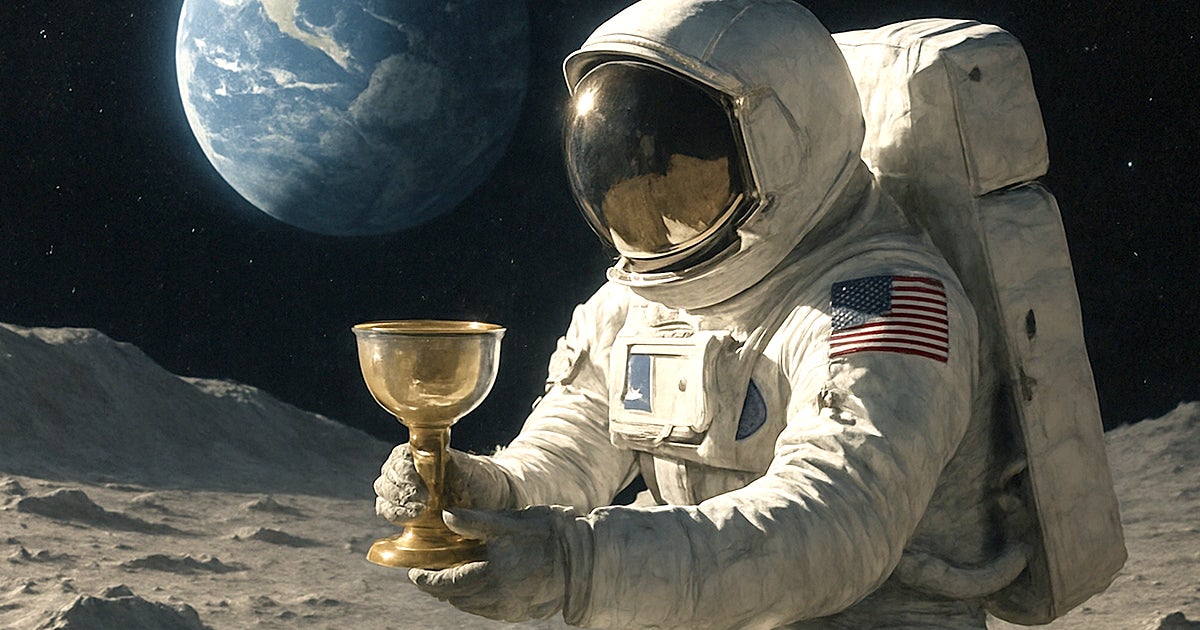
by Ana Elise Lowe • 3 minutes
On July 20, 1969, NASA’s Apollo 11 mission achieved the first successful lunar landing, with astronauts Neil Armstrong and Buzz Aldrin stepping onto the moon’s surface.
But something far more intimate—and spiritual—quietly took place that day. As the world watched history unfold, an act of religious expression was happening on the lunar surface.
After Apollo 11’s module touched down, Aldrin asked for a moment of silence. What the world didn’t know at the time is that, in silence, he pulled out a small communion kit from Webster Presbyterian Church in Houston, Texas, where he was an elder. He ate and drank the elements, becoming the first person to observe the Lord’s Supper in outer space. He also read a section of the gospel of John.
“I poured the wine into the chalice our church had given me,” Aldrin recounted in a 1970 copy of Guidepost magazine. “In the one-sixth gravity of the moon the wine curled slowly and gracefully up the side of the cup. It was interesting to think that the very first liquid ever poured on the moon, and the first food eaten there, were communion elements.”
It was a moment of profound faith, one that Aldrin thought should be broadcast to the world. But NASA asked him to keep it quiet, saying it could draw unwanted controversy.
Months earlier, firebrand atheist and activist Madalyn Murray O’Hair had sued NASA after Apollo 8 astronauts read from Genesis during a Christmas Eve broadcast from space. The space agency feared more legal trouble if Aldrin’s communion was seen as government-sponsored religion.
56 years later, Americans can learn something important from Aldrin’s act of faith. The moon landing wasn’t just as a symbol of national achievement. It was a reminder that faith and religious freedom were present even in one of humanity’s greatest scientific leaps.
Space Force Reservist Punished for Encouraging Truth and Integrity
Over 50 years, not much has changed. A toxic anti-religious bias still festers in our federal government, whether it’s in the military or other agencies. Many high-ranking officials think that expressions of faith must be censored. Or worse, they take action to punish American heroes who exercise their constitutional rights to free speech and religious freedom.
Today, Lt. Col. Jace Yarbrough, an officer in the U.S Space Force, is facing punishment for something he said while off duty, in his civilian capacity, at a private retirement ceremony. Motivated by his religious beliefs, Jace warned about dishonesty and a growing cancel culture in our country, including in the military. His remarks advocated truth and encouraged integrity.
Military officials responded by issuing him a formal letter of admonishment that will tarnish his record and possibly destroy his career.
First Liberty is representing and fighting for Jace in federal court. We’ve filed a lawsuit on his behalf, arguing that it is unconstitutional for the U.S. Air Force to punish someone for expressing their faith in a private setting. In his purely civilian capacity, Jace had permission to speak freely and exercise his U.S constitutional and federally protected rights as an American citizen.
Whether on the surface of the moon or behind a podium on Earth, the right to live and speak freely about one’s faith is a cornerstone of American liberty.
At First Liberty Institute, we are proud to stand with heroes like Jace Yarborough. We exist for moments like this, when the personal expressions of faith collide with institutional pressure to remain silent. Our mission is simple: to ensure every American can live out their faith freely—at home, at work, in uniform, or even in outer space.